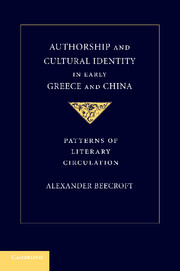Book contents
- Frontmatter
- Contents
- Acknowledgments
- Introduction
- 1 Explicit Poetics in Greece and China: Points of Divergence and Convergence
- 2 Epic Authorship: The Lives of Homer, Textuality, and Panhellenism
- 3 Lyric Authorship: Poetry, Genre, and the Polis
- 4 Authorship between Epic and Lyric: Stesichorus, the Palinode, and Performance
- 5 Death and Lingerie: Cosmopolitan and Panhuaxia Readings of the Airs of the States
- 6 Summit at Fei: The Poetics of Diplomacy in the Zuozhuan
- 7 The Politics of Dancing: The Great King Wu Dance and the Hymns of Zhou
- Conclusion: Scenes of Authorship and Master-Narratives
- Bibliography
- Index of Passages Cited
- General Index
Conclusion: Scenes of Authorship and Master-Narratives
Published online by Cambridge University Press: 03 May 2010
- Frontmatter
- Contents
- Acknowledgments
- Introduction
- 1 Explicit Poetics in Greece and China: Points of Divergence and Convergence
- 2 Epic Authorship: The Lives of Homer, Textuality, and Panhellenism
- 3 Lyric Authorship: Poetry, Genre, and the Polis
- 4 Authorship between Epic and Lyric: Stesichorus, the Palinode, and Performance
- 5 Death and Lingerie: Cosmopolitan and Panhuaxia Readings of the Airs of the States
- 6 Summit at Fei: The Poetics of Diplomacy in the Zuozhuan
- 7 The Politics of Dancing: The Great King Wu Dance and the Hymns of Zhou
- Conclusion: Scenes of Authorship and Master-Narratives
- Bibliography
- Index of Passages Cited
- General Index
Summary
Poetics, Explicit and Implicit
As we saw in Chapter 1, if we want truly to understand even the explicit poetics of either Greece or China, we must pay close attention at every moment to the fact that these poetic treatises are discussing verbal art that even they conceive of as taking life, not on the page, but in performance. I attempt throughout at least to sketch some of the possible directions such attention to performance might take, and some of the insights we might be able to gain thereby. At the same time, and in a related way, I observe that (especially when read with a sensitivity to performance) the poetic traditions of Greece and China are not as distinct as they seem at first. Certainly, elements of the doctrines espoused by the Poetics and by the Mao preface are quite distinct, but an examination of the implicit poetics of the scenes of authorship I have discussed throughout the book offer ample evidence to the contrary. The story of Terpander, for example, shows that the Greeks were fascinated with the idea that poetry could regulate human and interstate relations and could be constitutive of the state. The Great King Wu dance, likewise, shows that the Chinese were also convinced of the important role verbal art (as one of the performing arts) could play in reenacting foundational cultural myths.
- Type
- Chapter
- Information
- Authorship and Cultural Identity in Early Greece and ChinaPatterns of Literary Circulation, pp. 278 - 286Publisher: Cambridge University PressPrint publication year: 2010



